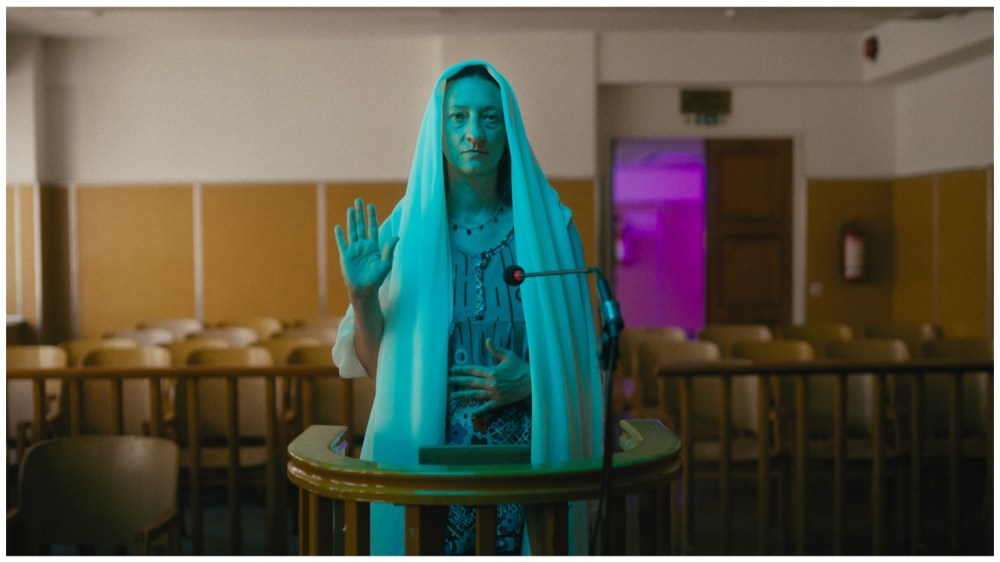Thessaloniki Doc Fest Fronts Queer Cinema, Fetes Same-Sex Marriage Law
Taking place just weeks after the historic passage of a bill legalizing same-sex marriage in Greece, the 26th edition of the Thessaloniki Documentary Festival — which runs March 7 – 17 — pays tribute to that watershed moment in the long-running fight for equal rights for the country’s LGBTQ community, while also issuing a rallying cry for diversity, inclusion and empowerment across the globe.
“Our festival aspires to map out a detailed and thorough overview of our world’s complexity, welcoming films from the four corners of the world, which outline the radical changes, the challenges and the problems of our times,” says festival general director Elise Jalladeau. The program spotlights “the urgent call for diversity, stories of women’s empowerment [and] the visibility not only of the LGBTQI+ community, but of all marginalized and oppressed groups of people who have suffered discrimination due to their identity,” she adds.
Following on the historic victory for same-sex marriage rights — a first for an Orthodox Christian country — this year’s edition of the Thessaloniki Documentary Festival includes a wide-ranging tribute to queer cinema, “Citizen Queer,” which features “films that run through the history of the LGBTQI+ movement, biopics on legendary figures, historical documents [and] up-to-the-minute docs that forge the constantly-evolving LGBTQI+ community,” according to Jalladeau. The festival will also mount a tribute to what it describes as the “fearless and pioneering cinema” of Panayotis Evangelidis, whose work has long focused on the visibility of the LGBTQ community. Evangelidis will be on hand to receive an honorary Golden Alexander award.

Farahnaz Sharifi’s intimate family portrait “My Stolen Planet” premiered at the Berlin Film Festival.
Courtesy of Farahnaz Sharifi
The festival begins March 7 with “They Shot the Piano Player,” a hybrid, hand-drawn animated documentary from Oscar-nominated Spanish directors Fernando Trueba and Javier Mariscal that focuses on the disappearance of Brazilian jazz pianist Francisco Tenório Júnior in Argentina in the ’70s. Trueba — described by Jalladeau as “one of the most distinguished directors in the history of Spanish cinema” — will be feted with an honorary Golden Alexander at this year’s festival, which will also include a sidebar celebrating the filmmaker’s work. The festival wraps March 17 with the world premiere of “Yanni Spanos: A Life Behind the Marquee,” directed by Aris Dorizas.
Thirty-six films will take part in the festival’s three competitive sections, with 35 of those celebrating world, international or European premieres. Among the highlights from the international competition are Silje Evensmo Jacobsen’ Sundance Grand Jury Prize winner “A New Kind of Wilderness,” which follows a family coping with loss after trying to escape civilization to live in the woods of Norway; Ramona S. Diaz’s “And So It Begins,” which documents the 2022 presidential election in the Philippines, and Anupama Srinivasan and Anirban Dutta’s “Nocturnes,” about the secret nocturnal universe of the Eastern Himalayas, both coming off of Sundance premieres; and Farahnaz Sharifi’s intimate family portrait of life during Iran’s 1979 Islamic revolution, “My Stolen Planet,” which took a second-place Audience Award after premiering in the Berlinale’s Panorama strand.
Among the 67 feature-length and short films representing the host country, a pair of notable world premieres — “Stray Bodies,” by Elina Psykou, and “Unclickable,” by Babis Makridis — represent forays into documentary filmmaking from Greek directors celebrated for their work in fiction. Makridis is best known for films including the Sundance premieres “L” and “Pity,” while Psykou’s “Son of Sofia” won the Tribeca Film Festival in 2017.
Her documentary debut, which follows four women seeking bodily autonomy in a Europe still lagging in the struggle for equal rights for women, will next travel to CPH:DOX for its international premiere — a feat of which Jalladeau is particularly proud. “We feel it shows the momentum that Greek documentaries have at this stage,” she says. “And of course, the festival is here to assist and help Greek filmmakers in any way possible, either in its industry section, Agora, or through the program.”

Sundance Grand Jury Prize winner “A New Kind of Wilderness” competes in Thessaloniki.
Courtesy of A5 Film
While striking a celebratory note, this year’s festival nevertheless unfolds against the somber backdrop of world affairs, as the mounting humanitarian toll of the Israel-Hamas war in Gaza continues to dominate headlines, while Russia’s war in Ukraine enters its third year. Meanwhile, the recent death in a Siberian penal colony of Russian opposition leader Alexei Navalny — which provoked global outrage and condemnation of Russian President Vladimir Putin — will be marked with a special screening in Thessaloniki of the Academy Award-winning documentary about the politician by filmmaker Daniel Roher.
That film — described by Variety‘s Owen Gleiberman as the “inspiring, scary, and profoundly important story” of the late opposition hero — spotlights the crucial role that documentary filmmaking continues to play today, according to Jalladeau.
“Documentary gives us another view of the world, gets us behind the scenes, at places where decisions are made and people live their everyday lives,” she says. “Documentaries have the power to change — if not our lives — our viewpoint, to offer us a better understanding of the complexity of human life, especially in the midst of war, violence and catastrophe.
“I admire filmmakers who are able to show the complicated reality in situations like these, while at the same time trying to find hope in the ruins,” she continues. “It is important to have these bold and courageous voices from artists who express a sense of urgency in what we experience. Our goal is to ensure that they can express themselves in a safe environment and that their message is heard.”
The Thessaloniki Documentary Festival runs March 7 – 17.

